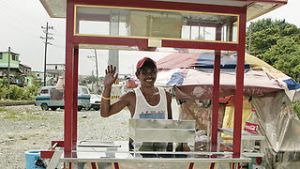Amidst the horrors of Metro Manila’s infamous perma-traffic can be found interesting stories of how ordinary Filipinos cope with the mess left by decades of administrative neglect. Australia’s SBS world documentary program Dateline featured the heartwarming story of Genaro Daclison, a Filipino father of two who made his living pushing a rail trolley on foot along Manila’s railway tracks in exchange for fare from obliging commuters. The original story was aired back in March 2010 and the feature was re-aired last Tuesday on the occassion of Dateline‘s 30th anniversary.
Daclison was interviewed and a couple of days in his life captured on video by Dateline correspondent Mark Davis in 2010. The story of Daclison’s life on the tracks, the dangers he faced shuttling paying Manila commuters on an illegal rail trolley he pushes on foot, and the baffling contrasts between the slums along Manila’s railways and “normal” life just over the fence from where Daclison lives and work reveals a world even many Filipinos are unaware of. For 18 years, Daclison lived this way.
| SUPPORT INDEPENDENT SOCIAL COMMENTARY! Subscribe to our Substack community GRP Insider to receive by email our in-depth free weekly newsletter. Subscribe to our Substack newsletter, GRP Insider! Learn more |
Reporter Davis observes of the circumstances that underlie Daclison’s way of life…
Like many large Asian cities, Manila’s private and public transport systems have long passed the point of overload, a system of choked roads designed it seems, to ensure that you can get nowhere fast. – unless you’re on one of these [refers to Daclison’s rail trolleys]. Intense gridlock has encouraged one little flower to bloom in the transport wasteland – the trolley cars of Manila.
Carving through traffic jams on one these little trolleys is a breeze, but not exactly a pleasure, with the thought of 1,000 tonnes of train looming around the corner.
Asked where and how he and his nine- and six-year-old sons live beyond the time they spend working the tracks, Daclison responds, “Me on the trolley with my two kids in the side car, a rolling side car – that’s my house.”
Davis adds more context…
At the entrance to the university [adjacent to the squatter camp where Daclison lives], a dozen or so trolley drivers live and ply their trade. This camp is as illegal as the trolleys themselves. Periodically there will be a raid by railways police here but the service the trolley guys provide buys them a lot of friends and a bit of tolerance. No-one else can cut 30 minutes off a bus or taxi ride downtown with a 5- or 10-minute trundle.
Considering that they share the tracks with thousand-tonne trains, both the rail taxi drivers and their passengers “know the drill” whenever the sound of a train’s air horn blasts from around the corner as Davis observes…
When the horn blows, you get off and move to the side – very quickly. As soon as the train passes, it’s back on board to enjoy another 2km or 3km of open road. Apart from some apparent safety flaws, the trolleys are everything public transport is meant to be – cheap, reliable and always on the move. And on the face of it, all the staff seem pretty chirpy too.

(Photo source: SBS Australia)
Unfortunately, Daclison may likely be the rare exception. Hundreds of thousands of Filipino families live in similar conditions not just along Manila’s rail tracks but also in other vacant, largely-neglected, spaces in the Philippines’ premiere megalopolis. Many of these parcels of land are government-owned lots such as the ones through which rail tracks are laid. But many of these pieces of prime real estate are privately-owned. Philippine land owners have also expressed frustration around the difficulty of developing land settled by squatters such as Daclison, many of whom organise themselves into formidable blocs of voters that Filipino politicians pander to.
For now, nobody in the Philippine government seems to be up to the task of solving these issues at a systemic level. And it is up to the private individual initiatives of ordinary good samaritans to open doors for hard-working and conscientious poor folk like Genaro Daclison.
benign0 is the Webmaster of GetRealPhilippines.com.
Dude, think about it …
Why the heck would you even imagine anybody in our government is capable of, much less interested in, solving these issues?
Our only hope is to be “liberated” by the Chinese PLA. Seriously. Our political cesspool will never change unless heads roll.
If that ever happens, his son will be able to live his dream as a soldier of the PLA.
And then I’ll be able to live my dream of FITA a PLA soldier. 😉
At 6:58 of the video:
Reporter asks: “Do people get hit sometimes?”
Man replies (with a smile): “Oh, plenty.”
LOL.
is benigno living in australia? i want to thank him personally for trying to uplift the lives of our fellow filipinos.